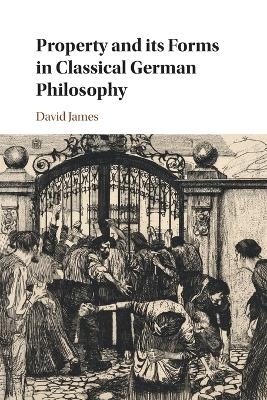
Property and its Forms in Classical German Philosophy
Seiten
2024
Cambridge University Press (Verlag)
978-1-009-28810-1 (ISBN)
Cambridge University Press (Verlag)
978-1-009-28810-1 (ISBN)
A comprehensive analysis of the theories of property developed by four key figures in classical German philosophy that explores such central questions as the nature of property, what specific forms of property are justifiable and whether property rights ought to be respected or limited in the name of freedom.
The theme of property is directly relevant to some of the most divisive social and political issues today, such as wealth inequality and the question of whether governments should limit it by introducing measures that restrict the right to property. Yet what is property? And when seeking to answer this question, do we tend to identify the concept with just one dominant historical form of property? In this book, David James reconstructs the theories of property developed by four key figures in classical German philosophy - Kant, Fichte, Hegel and Marx. He argues that although their theories of property are different, the concept of social recognition plays a crucial role in all of them, and assesses these philosophers' arguments for the specific forms of property they claim should exist in a society that is genuinely committed to the idea of freedom.
The theme of property is directly relevant to some of the most divisive social and political issues today, such as wealth inequality and the question of whether governments should limit it by introducing measures that restrict the right to property. Yet what is property? And when seeking to answer this question, do we tend to identify the concept with just one dominant historical form of property? In this book, David James reconstructs the theories of property developed by four key figures in classical German philosophy - Kant, Fichte, Hegel and Marx. He argues that although their theories of property are different, the concept of social recognition plays a crucial role in all of them, and assesses these philosophers' arguments for the specific forms of property they claim should exist in a society that is genuinely committed to the idea of freedom.
David James is Reader in Philosophy at the University of Warwick. His previous publications include Rousseau and German Idealism: Freedom, Dependence and Necessity (Cambridge, 2013), and Practical Necessity, Freedom, and History: From Hobbes to Marx (2021).
Introduction: 1. The mystery of the right to property; 2. The concept of property and forms of property; 3. Property, freedom and enlightenment: Kant's Rechtslehre; 4. Fichte on property and labour; 5. Property and ethical life: Hegel's system of right; 6. Equality, exchange value and individuality: Marx's critique of private property; Concluding remark; Bibliography; Index.
| Erscheinungsdatum | 31.08.2024 |
|---|---|
| Zusatzinfo | Worked examples or Exercises |
| Verlagsort | Cambridge |
| Sprache | englisch |
| Themenwelt | Geisteswissenschaften ► Philosophie |
| Sozialwissenschaften | |
| ISBN-10 | 1-009-28810-5 / 1009288105 |
| ISBN-13 | 978-1-009-28810-1 / 9781009288101 |
| Zustand | Neuware |
| Informationen gemäß Produktsicherheitsverordnung (GPSR) | |
| Haben Sie eine Frage zum Produkt? |
Mehr entdecken
aus dem Bereich
aus dem Bereich
wie Philosophie uns helfen kann, unseren Weg zu finden
Buch | Hardcover (2023)
dtv Verlagsgesellschaft
CHF 39,90
wie Hoffnung politisch wird
Buch | Softcover (2023)
Philipp Reclam (Verlag)
CHF 9,80


